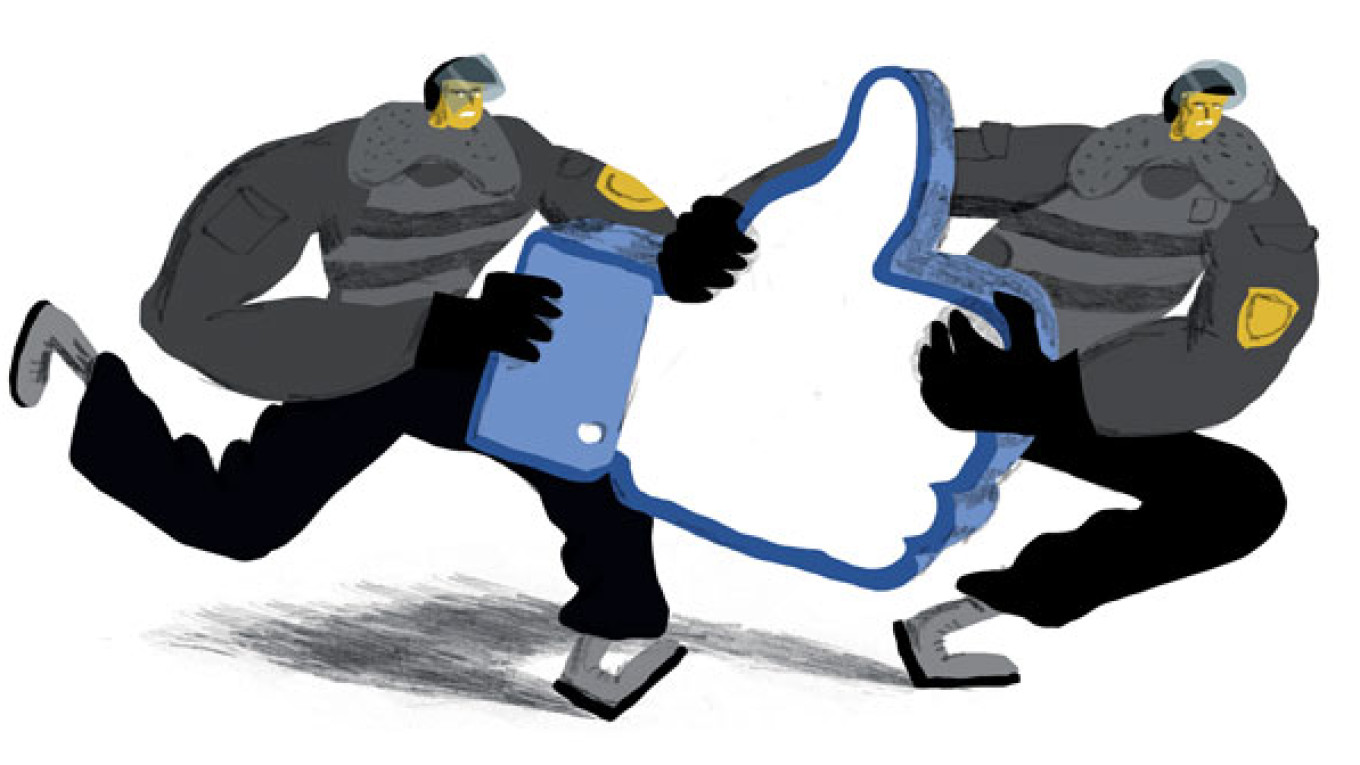It was a throwaway comment, forgotten almost the minute it was written. Then again, Viktor Krasnov could hardly have predicted the trouble those three words —"God doesn't exist" — would cause. He couldn't have imagined that two VKontakte users would file a formal complaint to the authorities, claiming the comment "insulted" them; that police would show up at his apartment in the southern Russia city of Stavropol a year later; that they would charge him with insulting religious feeling; that he would be committed to a mental institution; or that he would lose his business as a result.
"Never in a million years did I think law enforcement would pursue something like that," he told The Moscow Times.
Far from being an isolated incident, however, Krasnov's case is one of a growing number of prosecutions based on social media use. Since Putin's return to the Kremlin in 2012, dozens of websites have been blocked and branded "extremist," and the number of people prosecuted has ballooned.
But while some argue the war on social media is exclusively a tool against the opposition, a closer inspection reveals a more indiscriminate picture. All kinds of ordinary people have been targeted — you do not have to be criticizing Putin to be threatened with a jail term.
Farce Turns to Tragedy
Krasnov's case initially resembled a farce, but it quickly turned into tragedy. According to his lawyer Andrei Sabinin, counter-extremism officers first tried to charge Krasnov with "inciting hatred toward religion." When they saw that couldn't stick, they tried the charge of "insulting religious believers' feelings."
Then, the two "victims" — the young men who initiated the case — refused to participate in the trial. Eventually, they were dragged to court. In the dock, one had a hard time proving he was religious. "The other one looked more prepped," says Sabinin. The lawyer considers it likely that both men were used by law enforcement to "complete a plan" and report a certain number of convictions.
Krasnov faces up to one year in prison and a six-figure fine, though Sabinin is optimistic about the trial's outcome.
Yet his client has little to be happy about.
As the investigation against him picked up speed, Krasnov's life took a decisive turn for the worse. He lost his business — a forging workshop — after police had seized his business computer and documents. Then, he was sectioned for 30 days in a mental hospital after a judge ordered a psychiatric evaluation. The judge reasoned that no man "in sound mind would doubt or criticize the Orthodox church."
"I'm unemployed, I lost my business, and my reputation is ruined, but they won't succeed in scaring me or changing what I do online," says Krasnov.
Criminal Mice
Krasnov's online profile remains despite the legal threats against him. Others, like Yekaterina Vologzheninova, have scrubbed their online profiles clean as a result of court action. Vologzheninova was sentenced to 320 hours of community service for "inciting hatred and animosity," and now her VKontakte page only has pictures of nature and flowers.
Her crime was sharing a cartoon that depicted President Vladimir Putin bending over a map of war-torn Eastern Ukraine with a knife in his hand.
The 46-year-old single mother from the Urals city of Yekaterinburg had no idea she would be prosecuted for reposting a picture. "She's an ordinary woman, a cashier in a liquor store, and was completely lost when they charged her," Vologzheninova's lawyer Yevgeny Kachanov told The Moscow Times. "Like a lot of ordinary people in Russia, she isn't particularly literate in terms of legal issues."
Vologzheninova's case made national headlines when the judge ordered the destruction of her laptop and mouse — "criminal weapons." This gave rise to a whole line of jokes about justice in Russia coming down to the execution of computers. For lawyer Kachanov it felt like a medieval gesture: "They could have given it to charity or an orphanage — but why destroy it?"
Kachanov says the trial made him feel "like it was 1937 all over again." Prosecutors made Vologzheninova's co-workers testify about her conversations with them about Ukraine and government policies. The prosecution presented an expert analysis claiming that the woman had "incited hatred" and "abased the human dignity" of Russians by sharing such a negative image of Putin. After all, they argued, Putin "personifies Russian authorities," and such authorities consist mostly of Russian nationals.
Vologzheninova's team plan to appeal the ruling, and to go all the way up to the European Human Rights Court if necessary. Kachanov, however, hopes to win earlier — at the regional court appeal stage. "There are millions of pictures on the Internet like the one she reposted," he says. "I've no idea why they decided to target her."
Breakdown of criminal cases involving social media activity

Pressuring Activists
Darya Polyudova, an activist from Krasnodar, knows exactly why she was targeted.
An organizer of protest rallies, she had been arrested several times already. "I knew they were going to get me eventually for something, though I'd never expected it to be VKontakte posts," she said.
In December 2015 Polyudova, 27, was convicted to two years in a penal colony for three posts on VKontakte — all of them in support of Ukraine. "One of them was a picture of me standing at a rally with a sign that says 'No to a war in Ukraine, yes to a revolution in Russia,'" she said.
That, among other things, was considered "a call to extremist activities." Polyudova and her lawyer have appealed the ruling; the first hearing is scheduled for March 10.
After being labeled an "extremist," Polyudova, a lawyer by education, has had problems holding down a job. She sold flowers, gave out flyers, but was pushed out of these jobs eventually. Today, she works for the same company as her father, but doesn't think that will last long. "I'm sure the court will confirm the conviction and send me to a penal colony soon," the woman said.
Just like Polyudova, Dmitry Semyonov, leader of the Cheboksary branch of the opposition PARNAS party, was also convicted for "inciting extremist activities" (he shared a post on VKontakte with a picture that said "Death to the Russian Bastard"). Semyonov was convicted, with a fine of 100,000 rubles ($1,400), only to be amnestied immediately.
Semyonov, 27, told The Moscow Times the whole situation didn't surprise him. "FSB officers and people from the counter-extremism center used to warn me that I would "end up having problems," he said. "True to their word, that's what happened."
Semyonov was added to a database of extremists, his bank accounts were frozen and he was not allowed to leave town. Adding insult to injury, that he was a defendant in a criminal case launched by the FSB precluded him from participating in the 2015 regional elections.
The most interesting thing, says Semyonov, is that he didn't, in fact, post the picture himself. It was added to a post he shared automatically, and his defense presented evidence to that effect. The judge seemed to understand this too, the activist said. "I think that by implementing amnesty he tried to show that he sides with us," Semyonov said.
Fulfilling the Plan
When approached for statistics on the number of prosecutions of social media users, Russia's Interior Ministry declined to offer any guidance. They based such a denial on the fact that the counter-extremism center was a "secretive entity" and was unable to provide statistics in time.
According to Damir Gainutdinov of the Agora legal rights NGO, there were more than 200 cases taken out against social media users in 2015. Eighteen of these cases resulted in real prison terms. "Since 2015, the probability of ending up in jail for posting something on social media has increased dramatically," Gainutdinov said.
It's a change of tactics, the legal expert said. In 2011-2012 Kremlin counted on blocking online resources it considered dangerous, but that, in the end, wasn't enough. "Rutracker gained traffic after they blocked it, and Facebook turned down demands to block a page inviting people to a rally for the Navalny brothers," Gainutdinov says. "That's why they turned to pressuring users into not posting information — about Ukraine, or about the government."
Alexander Verkhovsky, head of the SOVA Center, a Moscow-based think tank specializing in extremism, told The Moscow Times that 90 percent of all "extremist" convictions in 2015 involved Internet activities. More than half of those involve VKontakte, the most popular Russian social network, he added.
Political cases naturally attract more attention, but most of those prosecuted for social media activities are ordinary nationalists. "Typically it's someone with nationalist views, who posts something really inflammatory and quietly gets convicted," says Verkhovsky.
Nationalists naturally gravitate to VKontakte to meet like-minded users, and law enforcement officers do the same to catch them. "It's easier to search for inflammatory postings there, and because it is a Russian network, its management administration is more likely to comply with requests to reveal personal data," Verkhovsky says.
Agora's Gainutdinov echoed his statement. "Just imagine how much easier it is than to chase skinheads in the streets," he said. "Investigators use VKontakte so they don't have to leave their desks."
Both Verkhovsky and Gainutdinov believe that main reason behind the increased number of prosecutions of social media users is the need to fulfill prosecution quotas.
"The issue of 'fulfilling a plan' is still there," Gainutdinov said.
Contact the author at d.litvinova@imedia.ru. Follow the author on Twitter at @dashalitvinovv
A Message from The Moscow Times:
Dear readers,
We are facing unprecedented challenges. Russia's Prosecutor General's Office has designated The Moscow Times as an "undesirable" organization, criminalizing our work and putting our staff at risk of prosecution. This follows our earlier unjust labeling as a "foreign agent."
These actions are direct attempts to silence independent journalism in Russia. The authorities claim our work "discredits the decisions of the Russian leadership." We see things differently: we strive to provide accurate, unbiased reporting on Russia.
We, the journalists of The Moscow Times, refuse to be silenced. But to continue our work, we need your help.
Your support, no matter how small, makes a world of difference. If you can, please support us monthly starting from just $2. It's quick to set up, and every contribution makes a significant impact.
By supporting The Moscow Times, you're defending open, independent journalism in the face of repression. Thank you for standing with us.
Remind me later.


